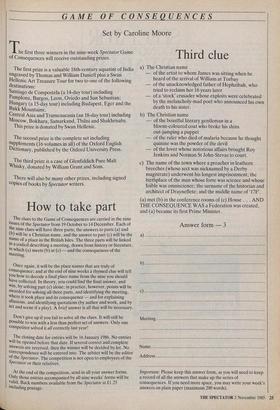GAME OF CONSEQUENCES Set by Caroline Moore
The first three winners in the nine-week Spectator Game of Consequences will receive outstanding prizes.
The first prize is a valuable 18th-century aquatint of India engraved by Thomas and William Daniell plus a Swan Hellenic Art Treasure Tour for two to one of the following destinations: Santiago de Compostela (a 14-day tour) including Pamplona, Burgos, Leon, Oviedo and San Sebastian; Hungary (a 15-day tour) including Budapest, Eger and the Bukk Mountains; Central Asia and Transcaucasia (an 18-day tour) including Moscow, Bokhara, Samarkand, Tbilisi and Shakhrisabz. This prize is donated by Swan Hellenic.
The second prize is the complete set including supplements (16 volumes in all) of the Oxford English Dictionary, published by the Oxford University Press.
The third prize is a case of Glenfiddich Pure Malt Whisky, donated by William Grant and Sons.
There will also be many other prizes, including signed copies of books by Spectator writers.
How to take part
The clues to the Game of Consequences are carried in the nine issues of the Spectator from 19 October to 14 December. Each of the nine clues will have three parts; the answers to parts (a) and (b) will be a Christian name, and the answer to part (c) will be the name of a place in the British Isles. The three parts will be linked in a codicil describing a meeting, drawn from history or literature, in which (a) meets (b) at (c) — and the consequences of the meeting.
Once again, it will be the place names that are truly of consequence; and at the end of nine weeks a rhymed clue will tell you how to decode a final place name from the nine you should have collected. In theory, you could find the final answer, and win, by solving part (c) alone; in practice, however, points will be awarded for solving all three parts, and identifying the meeting, where it took place and its consequence — and for explaining allusions, and identifying quotations (by author and work, and by act and scene if a play). A brief answer is all that will be necessary.
Don't give up if you fail to solve all the clues. It will still be Possible to win with a less than perfect set of answers. Only one competitor solved it all correctly last year!
The closing date for entries will be 16 January 1986. No entries will be opened before that date. If several correct and complete answers are received, then the winner will be decided by lot. No Correspondence will be entered into. The arbiter will be the editor of the Spectator. The competition is not open to employees of the Spectator or their relatives.
At the end of the competition, send in all your answer forms. Only those entries accompanied by all nine weeks' forms will be valid. Back numbers available from the Spectator at £1.25 including postage.
Third clue
a) The Christian name — of the artist to whom James was sitting when he heard of the arrival of William at Torbay — of the unacknowledged father of Hephzibah, who tried to reclaim her 16 years later — of a 'stock' crusader whose exploits were celebrated by the melancholy-mad poet who announced his own death to his sister.
b) The Christian name — of the boastful literary gentleman in a bloom-coloured coat who broke his shins out-jumping a puppet — of the ruler who died of malaria because he thought quinine was the powder of the devil — of the lover whose notorious affairs brought Roy Jenkins and Norman St John-Stevas to court.
c) The name of the town where a preacher in leathern breeches (whose sect was nicknamed by a Derby magistrate) underwent his longest imprisonment; the birthplace of the man whose forte was science and whose foible was omniscience; the surname of the historian and architect of Drayneflete; and the middle name of '17F'.
(a) met (b) in the conference rooms of (c) House . . . AND THE CONSEQUENCE WAS a Federation was created, and (a) became its first Prime Minister.
Answer form — 3
Meeting Name Address Important: Please keep this answer form, as you will need to keep a record of all the answers that make up the series of consequences. If you need more space, you may write your week's answers on plain paper (maximum 200 words).






















































 Previous page
Previous page